We are grateful to Oscar (and his mum Natalie) who worked with us in April 2024 to share his story here. Sadly, he passed away in December 2024. We remember Oscar as we continue our work to raise awareness of this devastating disease and to fund research to help find a cure. He will be forever in our hearts.
Oscar Fairs, a West Ham under-14’s goalkeeper from Benfleet, Essex, was diagnosed with an ependymoma in August 2023. During a period of eight months beforehand, he had experienced heart palpitations, right-sided weakness, headaches and sickness but he was initially misdiagnosed with mental health problems and migraines. The 14-year-old has had lots of complications following multiple surgeries but he is now seeing positive results from a clinical trial.
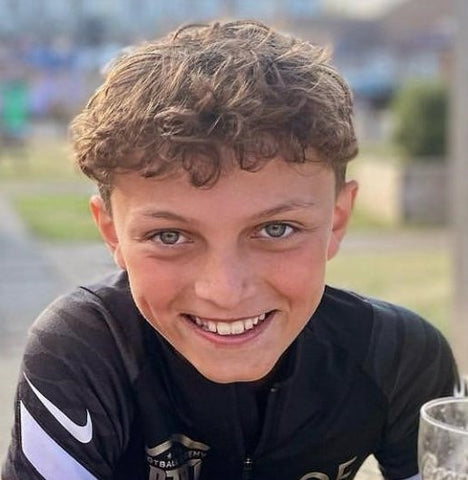
Here is Oscar’s story, as told by his mum Natalie …
Oscar was 13 and a goalkeeper for West Ham United Football Club’s under-14s when everything started in December 2022. Oscar ran upstairs to watch a film with us and suffered what appeared to be a panic attack. I managed to calm him down but his heart was pounding out of his chest, so I made a doctor’s appointment to get him checked out.
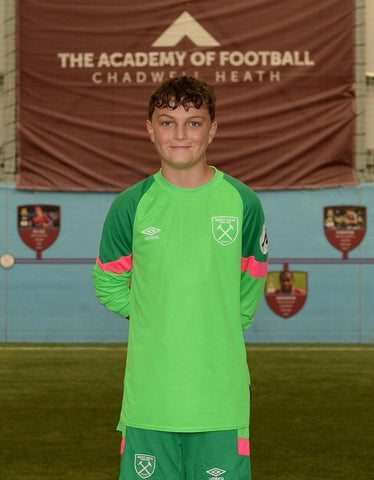
I told the GP Oscar was a healthy athlete who trained five days a week and had never had any heart problems.
He said it could be anxiety brought on by adolescence and to keep an eye on it. I reiterated that Oscar wasn’t an anxious boy but he said no one knows what their body goes through subconsciously and sent us away.
The same thing happened in early February 2023, so I phoned the doctor’s surgery to request an electrocardiogram (ECG). I was told Oscar needed to be brought in for another assessment and during that appointment the GP said it was likely caused by mental health issues and anxiety.
He suggested we got a counsellor and referred us to the Child and Adolescent Mental Health Services (CAMHS).

We paid for a private counsellor who told us Oscar was iron deficient. I couldn’t believe we were paying £50 an hour for someone to look at him and tell us that. I bought Oscar multivitamins and iron tablets but as the football season was coming to an end and he was due to go on tour, Oscar began feeling extremely anxious and was even talking about self-harming. I became really concerned and knew I needed more help. I spoke to Oscar’s school and they assigned a member of staff for him to go to and issued him with a classroom pass.
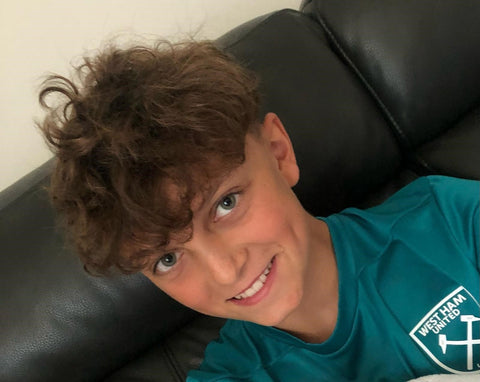
In April, the football club called to tell me they too were worried about Oscar.
I’d been pushing for more to be done and had booked him in for a blood test, which they were pleased about. They said he had been struggling with training and had burst into tears. I asked Oscar about this and he said it was because his right hand and leg weren’t right and he couldn’t make them do what he wanted them to.

The doctor arranged for Oscar to have his blood and stools tested, but both came back normal. I said something was clearly wrong because he wasn’t the sort to just burst into tears over nothing and, despite the club’s physiotherapist working with him on exercises, nothing was addressing his right-side deterioration. He’d also been getting a strange voice and I had noticed his lip moving on one side like it had been caught by a fish hook.
I thought maybe he had a blood clot or had suffered a stroke but we still didn’t get any answers.
CAMHS finally carried out a 2.5-hour assessment with Oscar via Zoom and their view was that he was suffering from hypothetical anxiety and was ‘on the spectrum’. It was so ridiculous that I decided to close the chapter on Oscar’s mental health. I burst into tears and promised him we’d get to the bottom of what was wrong.
When Oscar started getting headaches and began suffering from vomiting fits in July 2023, I went back to the doctor and told her we needed to act now.
She referred him to the Southend Hospital’s paediatric assessment unit (PAU) and we received a letter asking us to call if we hadn’t heard anything by a date in late August.
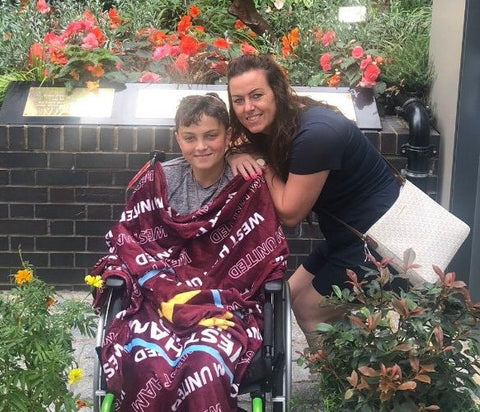
The deterioration in Oscar’s right-hand side became horrendous, such that he’d lost virtually all mobility in it.
He had first mentioned numbness in his right arm in the summer of 2022, but I told him he’d probably been leaning on it. Now he couldn’t walk properly and would take a step with his left foot and drag himself forward by pulling his right shoulder over. It was upsetting to see as he’d always been so active, and his headaches and sickness would be a problem one day and not the next. It just didn’t make any sense.
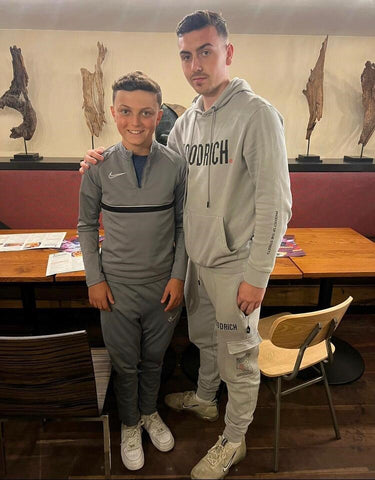
We decided to take a family holiday but whilst we were there Oscar vomited for three whole days. It was like a scene out of The Exorcist, as if something was leaving his body. I took him home and straight to A&E at Southend. Oscar was in a wheelchair and couldn’t physically open his eyes because he had so little energy, but we weren’t allowed to go to the PAU without a referral from the on-site doctor who misdiagnosed him with migraines. I explained how sick Oscar was, that he was a footballer who couldn’t even kick a tissue, let alone a ball, but the doctor said it was a Sunday afternoon and Oscar wasn’t in a life or death situation, which was what was required for that ward.
I begged her to refer us to the PAU but she refused, and instead recommended a nasal spray and four days in a dark room.
I took Oscar home and cried to my husband, Russell, who said we were going to have to pay for him to be seen privately. But Oscar took the skin off his right toes because he couldn’t pick his foot up and I told him I was going back to the hospital and not leaving until he had been seen by the PAU. After Oscar filled up three buckets with vomit, a PAU doctor arrived to refer Oscar to the ward.
It was such a relief to finally have someone listening.
He sent Oscar for a few tests, including an eye test, and commented that when he smiled, the right-side of his face didn’t move. I told him I knew but no one had been listening to me at which point he took us for an MRI. That’s when everything changed.
I was told Oscar had a 9cm tumour on the left side of his brain, attached to his motor system, with three cysts on the outside.

We were referred to Great Ormond Street Hospital (GOSH), in London, where they put Oscar on a high dependency unit. All he knew is that something serious had been found in his head and he needed to see a specialist. He had another MRI scan there, which showed a 7cm tumour with three cysts on the inside. The position of the cyst was important because it was less likely to rupture inside, which would have killed Oscar instantly.
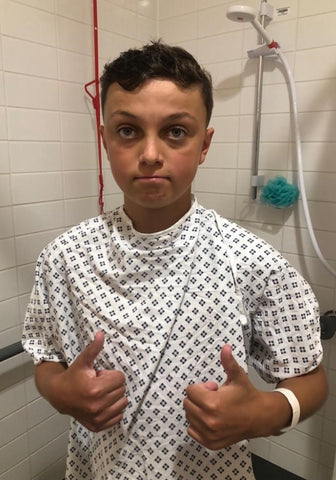
Oscar’s first surgery took place on 31 August 2023. We were told they’d removed 99% of his tumour but didn’t want to risk paralysing him by removing the last 1%. We had an agonising three-week wait to find out if it was low-grade or cancerous during which time Oscar had to be treated for hydrocephalus three times. His surgeon led Russell and I into a private room and told us Oscar had a high-grade ependymoma. I just couldn’t believe our boy had brain cancer.
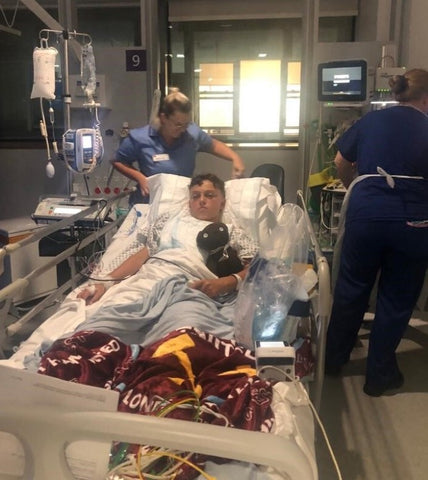
Oscar had a lumbar puncture to relieve the pressure caused by the hydrocephalus, during which 40ml of cerebrospinal fluid (CSF) was removed.
He then had a further surgery to remove the last bit of his tumour. After that he was supposed to be going straight into proton beam therapy, which is used to kill any remaining cancer cells. He was fitted for a mask at University College London Hospital (UCLH) but days later he was rocking back and forth in pain and throwing up.

We went to back Southend Hospital and Oscar was referred to GOSH with a midline shift, a medical emergency in which pressure pushes the entire brain off-centre.
The surgeon made a burr hole in Oscar’s skull to relieve the pressure on his brain, which he determined had been caused by a pocket of old blood. However, four days later, Oscar started rocking again and needed to have a permanent shunt fitted.
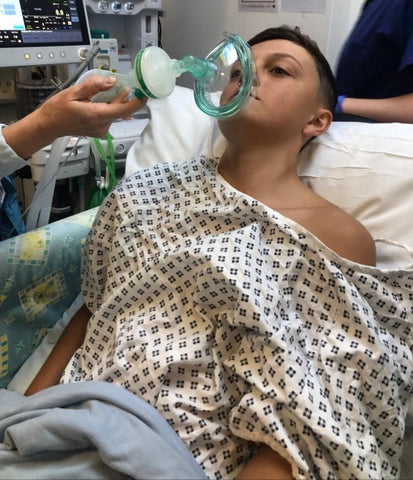
This time he was kept in hospital for two weeks and I was getting increasingly concerned because I knew Oscar needed to start proton beam therapy within six weeks in order to stop his cancer cells from multiplying and we were approaching week eight. He had also developed four massive lumps in his head, which we were told was the result of his skull growing back together.
When Oscar was discharged, we were hopeful of finally making it to proton beam, but a few days later he began screaming in pain. By the time we got to GOSH, he was fighting for his life. An MRI scan showed the cancer had spread to the whole left-hand side of his brain and instead of one tumour, he now had six.
We were told our son was going to die and led into a room with seven doctors to discuss palliative care.
I told them I wasn’t going to let him go easily and convinced them to give him emergency chemotherapy so I could get him to proton beam therapy. Three weeks later, I got a call informing me Oscar’s tumours were shrinking and they were going to open him a clinical trial involving vincristine, etoposide and cyclophosphamide (VEC).
We’re now on cycle seven and because Oscar’s brain is in better shape, he’s able to take cisplatin, which is known to have an effect on ependymoma.
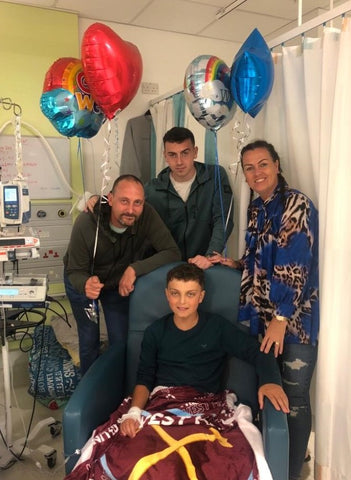
Oscar had a scan a few days ago which showed further shrinkage. It’s so good to finally feel like we’re on track to beat this. We’re now able to start planning for him to have radiation. We’re just not sure yet whether that will be for six weeks, or more intensive for just one, but things are looking much more positive and I’m so grateful.
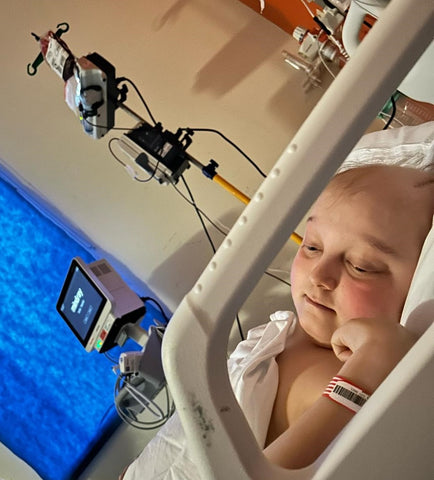
I’m also grateful for all the support we’ve had, from family, friends, charities, and even complete strangers.
Local charities sent us things to help make our lives easier and Russell’s best friend organised a football fundraiser to ensure last Christmas was as memorable as could be. Among the chaos of endless hospital stays and missed work, our friends took it upon themselves to set up a crowdfunding page for us. Crucially, this raised more than £30,000, with donations coming from strangers as well as those who know and love us. That money helped keep us afloat for a while but things are getting tough again and we know we still have a long way to go on this cancer journey. Anything anyone can spare would be most appreciated: www.gofundme.com/f/the-fairsy-fundraiser-for-our-oscar.
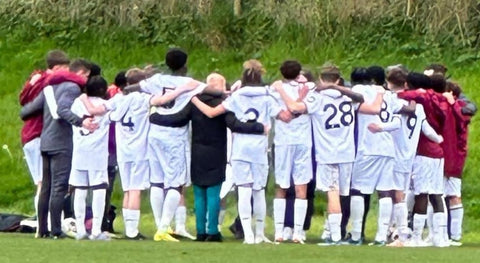
We’ve also inspired friends and family to take part in a range of challenges, including cold water dips, marathon runs, head shaves and Wear A Hat Day, which Oscar’s school supported last month, raising £1,100 for Brain Tumour Research. We recognise how important it is to give back and fully support everything they’ve done and continue to do in Oscar’s name.
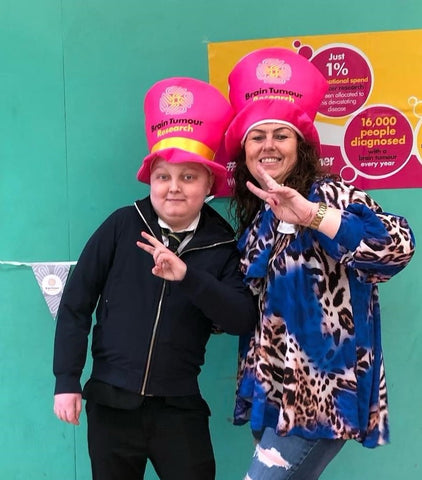
Natalie Fairs
April 2024
Brain tumours are indiscriminate; they can affect anyone at any age. What’s more, they kill more children and adults under the age of 40 than any other cancer... yet just 1% of the national spend on cancer research has been allocated to this devastating disease since records began in 2002.
Brain Tumour Research is determined to change this.
If you have been inspired by Oscar’s story you may like to make a donation via www.braintumourresearch.org/donate or leave a gift in your will via www.braintumourresearch.org/legacy
Together we will find a cure

